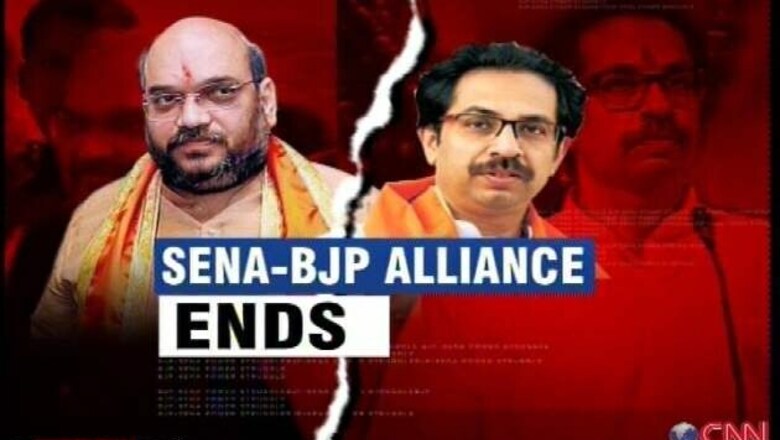
views
The 25-year-old Bharatiya Janata Party-Shiv Sena alliance came to an end on Thursday with BJP leaders announcing that the party has decided to accommodate smaller alliance partners like Swabhimani Shetkari Sanghatana, Shivsangram and Rashtriya Samaj Paksha. The BJP is even trying to lure the Republic Party of India (Athwale) to attract Dalit voters into its fold. However, BJP leaders clarified that they will not enter into an alliance or post poll adjustment with the Nationalist Congress Party.
Despite negotiating for 22 days the BJP-Shiv Sena alliance came to an end. Shiv Sena mouthpiece the Dainik Saamana on Friday vehemently criticised the BJP calling them crows of Pitrapaksha (a 16-day period when Hindus pay homage to their ancestors) flying away. The Shiv Sena said it will fight its erstwhile ally in the Maharashtra Assembly elections.
Recalling the sacrifice of 105 Marathi hutatmas (martyrs) during the Sanyukta Maharashtra agitation to save Mumbai, the Shiv Sena warned that no efforts to undermine Mumbai's importance will be tolerated henceforth.
Despite the bitterness after the breakup, the people of Maharashtra were in favor of BJP-Shiv Sena alliance and expressed their grief after the sad split on the eve of Assembly elections. It may be recalled that the BJP-Shiv Sena alliance was announced in 1989 at a public meeting in Solapur when prominent BJP leader Atal Bihari Vajpayee announced that henceforth 'Hindus will not get beaten'.
Since then, the Shiv Sena has remained as the alliance's dominant partner and participated in Ram Jnambhoomi-Babari Masjid agitation and other issues with the BJP. The alliance worked very hard on the backdrop of the March 12, 1993 bomb blasts and won power in 1995. There were many differences within the BJP and Shiv Sena on several occasions like the Enron issue, support to Pratibha Patil as a candidate from Marathi in presidential election as well as support to Pranab Mukherjee in the next presidential elections.
However, late Pramod Mahajan and late Gopinath Munde played an instrumental role in sorting out the differences promptly. In the recent Lok Sabha elections, too, the Shiv Sena played an active role along with Munde in shaping out the Mahayuti, which is a combination of the Dalit-Maratha-OBC vote bank.
Ironically, smaller parties like the Mahasangh, Shetkari Sanghatana etc remained with the BJP. The bickering between BJP and Shiv Sena intensified when it was disclosed that Shiv Sena has constantly faced defeat in 59 seats in the past elections.
However, it is a fact that in an attempt to play the role of a big brother, Shiv Sena blindly accepted the seats in the predominant Vongress belt in Maharashtra, whereas on the other hand, the BJP meticulously selected seats where the party was strong.
Former BJP president Nitin Gadkari, who has RSS support, was never in favour of the Shiv Sena, its attitude or its approach. The BJP found itself in a very humiliating position with the growing undue importance and dominance of Matoshree, the Shiv Sena headquarters, autocratic nature of the Thackerays and aggressive Shiv Sainiks.
Moreover, BJP state leaders aspired to win the elections unilaterally with the help of the Narendra Modi wave and did not want the nuisance of Shiv Sena in sharing power.
On the other hand, Shiv Sena Executive President Uddhav Thackeray rightly assessed BJP's move and took a tough stand over seat sharing. Even at the time of splitting, the Shiv Sena was reluctant to give away even a single seat from its quota to others small partners.
In fact, Shiv Sena has a well-oiled network in Maharashtra and Shiv Sainiks appreciated Uddhav's desire to contest for the position of Chief Minister of Maharashtra. It was felt that the people love the dynastic rule, which was witnessed in Sangharsh Yatra of Pankaja Munde-Palve after the sad demise of Gopinath Munde.
Essentially, the alliance was based on a strong bond of Hindutva which inspired both parties to maintain unity. However, in the recent elections, it became clear that the Hindu card has lost its importance with time and developmental issues remained on the agenda.
The new young voters, sizable in number, are least bothered about religious issues. However, Shiv Sena is still rallying around the issue of internal security, which according to the party is closely related to Hindutva.
Despite the long standing differences between the two parties over the Vidarbha issue, both parties remained together as it was distant dream.
However, presently Vidarbha leader Nitin Gadkari and state BJP President Devendra Fadanavis are very much committed to a separate state and it seems that it will come into existence before the next parliamentary elections.
Vidarbha will remain as a strong BJP base in the Assembly elections while smaller partners will help it in Western Maharashtra, the strong base of NCP. In a way, BJP made a strategic alliance with smaller partners by isolating the Shiv Sena.
However, the Shiv Sena is also having a strong base in Mumbai, Thane, Marathwada and other parts of the state. It seems that Shiv Sena will fight the election with the killer instinct like a final war for the state and Uddhav Thackeray will spell out his strategy in the Mumbai meeting on Saturday.
(Sanjeev Unhale is former executive editor Lokmat, Aurangabad. He will be writing for ibnlive on Maharashtra assembly elections)














Comments
0 comment